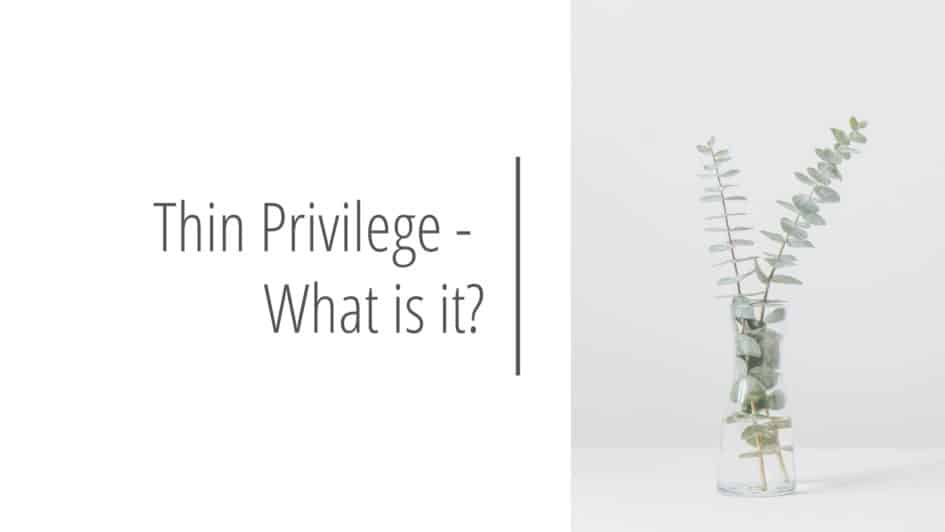What is thin privilege? Is thin privilege real? Those are two questions you might be asking right now. Keep reading to find out!
Table of Contents
What is Thin Privilege?
If you have heard the term before and are familiar with the concept, then you’re probably aware that it can be a controversial topic. When I first heard the term, a lot of questions popped into my mind. Is this really a thing? How have I not noticed this before? What can I do to educate others?
So what exactly is thin privilege? The standard definition of privilege is a “right, immunity, or benefit enjoyed only by a person beyond the advantages of most; the condition of enjoying special rights or immunities.”
Once you understand the definition of privilege, it’s easy to understand what thin privilege is. The term implies that people who reside in thin bodies get to enjoy certain advantages and benefits that individuals residing in larger bodies don’t (1).
Examples of Thin Privilege
The best way to explain thin privilege is to provide examples (2).
Thin privilege exists when…
- An individual’s health status is not based solely on the outward appearance
- An individual’s size is most likely not the first thing people notice about them
- An individual can shop at the grocery store without receiving judgmental looks or comments about purchase choices
- An individual’s health insurance rates aren’t automatically higher than everyone else’s, regardless of the presence or lack of chronic disease
- An individual can easily find and buy clothing in their size
- An individual doesn’t commonly receive suggestions from family and friends about starting a diet or joining the gym
- Doctors don’t automatically assume an individual is unhealthy
- People don’t assume that an individual is lazy or unmotivated
- Peers or coworkers don’t automatically perceive an individual as sloppy or unprofessional
- An individual can eat junk food in public without others judging or making assumptions about their eating habits
- An individual can sit comfortably in a chair in a waiting room, movie theater, airplane, bus, etc.
- The media doesn’t describe the size of an individual’s body shape as part of an “epidemic”
- People don’t automatically assume an individual is out of shape
- An individual has never experienced any of the things listed above
Why is Thin Privilege Controversial?
Refusal to Acknowledge Existence
If I had to state one main reason why thin privilege is controversial, it would be that people simply refuse to acknowledge its existence. Common conversations revolve around how thin people can receive body shaming too, how thin people can also have body image issues, and that being thin isn’t actually a form of unearned privilege.
I totally understand where these thoughts come from because I had similar thoughts when I first heard about the concept. However, having thin privilege doesn’t mean that someone has never experienced these things. It doesn’t even mean that someone recognizes or believes they’re thin.
As Christy Harrison, a well-known anti-diet RD, said “you can have thin privilege and also hate your body.” In the end, recognizing thin privilege is supposed to address a systemic disparity in our culture and encourage respect for all bodies (3).
Previously Formed Opinions
Another reason the concept is controversial is that people have pre-formed opinions about individuals in larger bodies. These opinions tend to be that large-bodied folks don’t deserve the same things as small-bodied folks. The common thought is that fat people are just using thin privilege as an excuse to complain and be lazy.
I have a pretty strong opinion about that.
First, I want to be blunt… regardless of someone’s weight or health status, all bodies (specifically the people inside those bodies) deserve to be treated with respect. Just because someone resides in a larger body, doesn’t mean they deserve to miss out on things thin-bodied people get to enjoy every day.
Second, I strongly support Health at Every Size (HAES), an evidenced-based, non-diet approach to health. If an individual truly can achieve health at every size, which according to society puts them on the same playing field as thin people, then wouldn’t that mean people in larger bodies deserve the same respect as those in smaller bodies?
Lastly, I want to reiterate that regardless of someone’s body size or health status, everybody deserves to live an enjoyable and fulfilling life where they are treated with respect and dignity.
Quick Summary
Thin privilege is a term that describes the privilege individuals in smaller bodies experience that individuals in larger bodies do not. Examples of this concept can be seen anywhere including the doctor’s office, airplanes, grocery stores, clothing stores, and even the work environment.
Thin privilege can be a controversial topic due to the refusal to acknowledge its existence and previously formed opinions of individuals in larger bodies. In the end, thin privilege should not be controversial. It’s important to remember that, no matter the size of an individual’s body, each person deserves to be treated with dignity and respect.
To learn more about topics like this, check out my website for articles about Intuitive Eating, Health at Every Size (HAES), body positivity, and all things anti-diet.
Want to help spread awareness about this topic? Check out my anti-diet themed store for fun body positive products!
Thanks for reading!
Rachel Beiler, MHS, RD, LDN


Leave a Reply